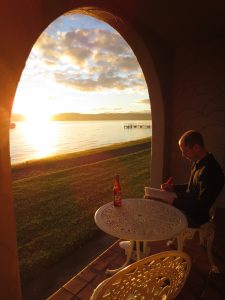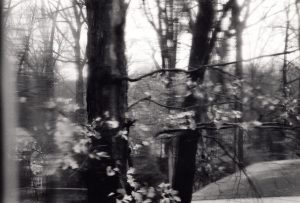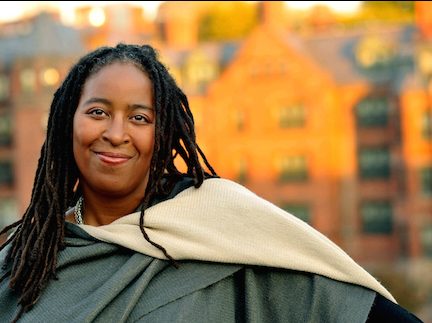Asked by David Trinidad
What is your first memory?
I have some co-first memories. I don’t know how real they are. But first is being dropped; falling. My mother was carrying me from the living room into our “play room.” There is a step down. A toy left out and she stepped on it and dropped me. She caught me, but the first memory is of falling. I was told, too, that once I fell down the basement stairs. I guess I know what’s wrong with me! Another early one is being at Virginia Beach and getting absolutely wiped out by a wave. I was wearing a white T-shirt with the outline of George Washington’s face in electrically bright colors of orange and green.
You’ve written a biography of Sylvia Plath, co-written a book (with Gail Crowther) about working in the Plath archives, and co-edited (with Karen V. Kukil) two volumes of Plath’s letters. What drew you to Sylvia Plath?
Entering my junior year of college last century, I was dumped by my first love. I decided to take an introduction to poetry course as I had been writing poems and lyrics. All bad. In the course we started with Anonymous and ended after the Confessionals. It was in reading “Lady Lazarus” that I felt, for the first time in weeks, that I’d get over losing the girl. When I asked my professor for more information about Plath, he tried to dissuade me from it, which I felt was an odd thing. Luckily, a friend knew about Plath and helped me find her books in the library. Another professor was very supportive and helpful, but she said Plath would be a phase. Twenty-four years later . . .
One of the last things Sylvia Plath wrote was the beautiful description of her childhood landscape, “Ocean 1212-W.” Can you describe your childhood landscape?
My childhood landscape was not that sea but the hilly, wooded suburbs of Virginia just on the other side of Washington, D.C. We lived in the middle of the block, on a steep hill, under immense oak trees that made a leafy canopy cover. It was always shady, but with light slipping through when there was a breeze. Humid summers, thunderstorms, with rains gushing down the gutters. We would run out once the lightning stopped, barefoot, and let the racing water cascade over our feet. Or we’d run up to the nearby church to watch the water evaporate in the sun, the steam rising up like writhing spirits. Or bicycling with my twin brother to 7-11 for a Slurpee. The ubiquitous ice cream truck enticing us outside. Playing baseball, or any sport, collecting and trading baseball cards. My childhood landscape was not the sea, but it was, or is, or seems to be summer. I know there were other seasons. But it was summer, and it was always as big and as vast and as limitless as the ocean.
You’re somewhat of an expert on The Bell Jar. What can you tell us about the novel that we might not know?
Maybe this is known, I’m not sure. But one thing that fascinates me about The Bell Jar is the few instances of foreshadowing in the novel. I feel like Plath was exceedingly careful in relating that she “recovered,” but was also quite restrictive about what had gone on after she was (presumably) released from the asylum. We’re told in Chapter 1,
For a long time afterward I hid them [free gifts including a white plastic sunglasses case and a make-up kit] away, but later, when I was all right again, I brought them out, and I still have them around the house. I use the lipsticks now and then, and last week I cut the plastic starfish off the sunglasses case for the baby to play with.
The other instance I can think of comes in Chapter 11 and regards Buddy Willard’s future:
Then nobody would know I had thrown up a scholarship at a big eastern women’s college and mucked up a month in New York and refused a perfectly solid medical student for a husband who would one day be a member of the AMA and earn pots of money.
A draft of the novel features some of Esther’s future such as experiencing a bull fight in Madrid (Chapter 6, in the childbirth witnessing scene). Ultimately, she cut that out and I’m rather glad she did.
What are some other favorite novels?
Frankenstein. Steppenwolf. To Kill a Mockingbird. The Catcher in the Rye. Wuthering Heights. Dracula. The Woman in White was terrific. Innocent Blood by P. D. James blew me away; it was the kind of murder mystery book I would want to write if I had talent.
As co-editor of The Letters of Sylvia Plath, you’ve transcribed and annotated innumerable letters. Can you discuss your process and what it’s been like to spend so much time in Sylvia Plath’s head?
The process has been one of repetitiveness. I’m sure there might have been a better, easier way to do this, but the workflow I came up with worked for me and I think satisfactorily got the work done to my standards. To be brief, each letter I acquired has a PDF or a JPG of the original. Each of these has a corresponding Word file. This enabled me to very easily count the number of letters there were (in addition to maintaining a complete list in Excel). It was just a matter of trying to perfect each word on an individual letter: to get an exact match between what Plath wrote and how it would therefore appear in the book. As for spending all that time in Plath’s head . . . I felt intrusive occasionally. I never had this issue reading her published journals, for example. But working with the original letters, or facsimiles of them, was somehow a much more intimate experience. Seeing the handwriting, the typewritten letters, etc. It is a more authentic interaction than with the printed text.
What is your favorite movie and why?
Just one?! That’s difficult. If I had to pick one, it would be Ferris Bueller’s Day Off. My mother called me Ferris, lovingly (I hope) and as a joke I guess because I was a decent kid but also kind of mischievous. I was never absent from school nine times, though. Because I am compelled to do so, other favorites that could very easily have been number one are Dead Poets Society, The Empire Strikes Back, and Trainspotting.
What do you do when you’re not “Plathing”?
Family! I try honestly to be the best husband I can be to my wife and be a good son, brother, uncle. Family is the most important thing in my life. I do like to watch baseball. I guess I do this when I’m “Plathing,” but not with such concentration or feeling of escapism.
You have a substantial collection of Plath books and artifacts. What is your most prized Plath possession?
This is like being asked which, amongst your children, you favor the most. I know some parents could actually do it! I’ll try. I think it has to be my first edition Victoria Lucas The Bell Jar. I bought it in 2001, I think, right before prices skyrocketed. It’s not the prettiest of books, but I couldn’t care less about that. It’s the closest version of the book to Plath’s intention; I like knowing that while she didn’t see my copy, she saw and owned its twin.
What is your favorite Plath poem?
You mean today? Today it’s “Sheep in Fog.”
What was the last dream you remembered?
The other day I dreamed that I was in some random neighborhood in New Jersey, walking around, and ran into Mike Trout, the baseball player. We chatted for a bit and he was really cool. I had a photo album of pictures that someone had given to me to get signed by him, but when he saw that they were pictures of his house and stuff he kind of shied away from me and left. Then, I was in the house of the guy that had given me the album and I didn’t know how to tell him the photographs had freaked out Mike Trout. I dreamt that after a weird evening of ingesting red wine (for dinner), Flonase (for allergies), and Melatonin (cause my mind was racing). So make of that what you will.
How does your wife feel about your “relationship” with Sylvia Plath?
She couldn’t care less about Sylvia Plath. But she’s a saint for putting up with my interest in her. No matter what project I may be working on, the wife comes first. So I’m always happy to put down the book, photocopy, or computer to do whatever needs to be done.
You’ve documented your pilgrimages to the places where Sylvia Plath lived: her childhood home in Wellesley, Massachusetts; her Chalcot Square flat in London; North Tawton in Devon. What is it like to frequent, or haunt, if you will, such spaces?
I don’t think there’s another experience like it. To step into a Plath poem, letter, story, journal entry is a wonderful encounter. It alters your perspective on the text; even on the actual life. Especially so in places that are unchanged or very little changed since Plath’s time. Being ankle-deep in water at Rock Harbor looking at clusters of mussels; standing on the hill of macadam Plath trotted on the horse Ariel; walking through the woods where she summer-camped . . . really opens up the work and the life in equal measures. The instances where I have been fortunate to gain access to a place where Plath lived are amongst my most treasured hauntings. And what I’ve always felt was, “how can I let other people get this close—or as close as possible—to what I am witnessing.” It’s never ever been about me. It’s about us.
What are your honest feelings about Ted Hughes?
To be honest, when I first started reading Plath I hated him. But after he died, I truly felt it was not possible to hate a dead person so I just kind of let that go. (And I think in general it probably isn’t worth the effort to hate someone you never knew.) There are better things to spend your time doing. I think “Hawk Roosting” is his best poem.
Hughes once wrote that he didn’t actually destroy, as he’d formerly stated, Plath’s last journal. Do you have hope that we’ll ever get to read Plath’s missing journals, or her unfinished second novel?
Yes, I really do hope these documents do exist and will see the light of day. I believe they will.
How would you like to die? (I stole this question from the Proust Questionnaire.)
In my sleep, peacefully, and with absolutely no pain. When I go, I just want to go.
What don’t you know about Sylvia Plath that you’d like to know?
I’d like to know how she walked; what she looked like when walking. I guess following on that, I’d like to see how she moved in general. This in part stems from something Eddie Cohen wrote to Plath on 15 December 1952:
I had managed, during the rather short period when I was with you, to establish a reasonable correlation between actuality and what I had created in my mind, between your physical being and the person I knew through letters. I had come to know and like the little things that make the differences in people—the sound of your voice, the way you tan, the languorous, comfortable way you curl up in a booth, the trick you have of licking the air with your tongue when discussing an idea, almost as though you were literally tasting it, the way you double your legs under you when sitting on a couch—all these things were making you at last a three-dimensional, and desirable, person. I knew, that last night, as I sat in the car and watched you talk as the moonlight played about your sensuous face and feminine body, that you were a woman I could easily love (as a real being, not as an ideal), although I knew at the same time that you have no inclination to brook any such idea.
Can you tell me something that you’ve never told anyone else?
I saw the Spice Girls in concert and their movie, Spice World. On opening night.
Shut up.
Is there anything you wish I’d asked you?
Will you “retire” from Sylvia Plath?
Bucket list?
 It seems like travel is always a bucket list item: I’d like to see the Grand Canyon, to visit the area where Gail Crowther lives in England, visit Baseball Hall of Fame, and see a World Series game. Most recently checked-off items were to go to Pittsburgh (awesome city), visit New Zealand, and to catch a home run ball (admittedly it was during batting practice and there were about twelve people in the ballpark; I tracked it off the bat and positioned myself to catch it nonetheless).
It seems like travel is always a bucket list item: I’d like to see the Grand Canyon, to visit the area where Gail Crowther lives in England, visit Baseball Hall of Fame, and see a World Series game. Most recently checked-off items were to go to Pittsburgh (awesome city), visit New Zealand, and to catch a home run ball (admittedly it was during batting practice and there were about twelve people in the ballpark; I tracked it off the bat and positioned myself to catch it nonetheless).
Peter K. Steinberg is coeditor of the two-volume edition of The Letters of Sylvia Plath (Faber & Faber/HarperCollins, 2017/2018). He lives in the Boston area.
David Trinidad’s latest book is Swinging on a Star (Turtle Point Press, 2017). He lives in Chicago.
Cover Image: Editing the proof of Volume I in Lake Taupo, New Zealand, on May 24, 2017. Photo by Courtney Steinberg.


